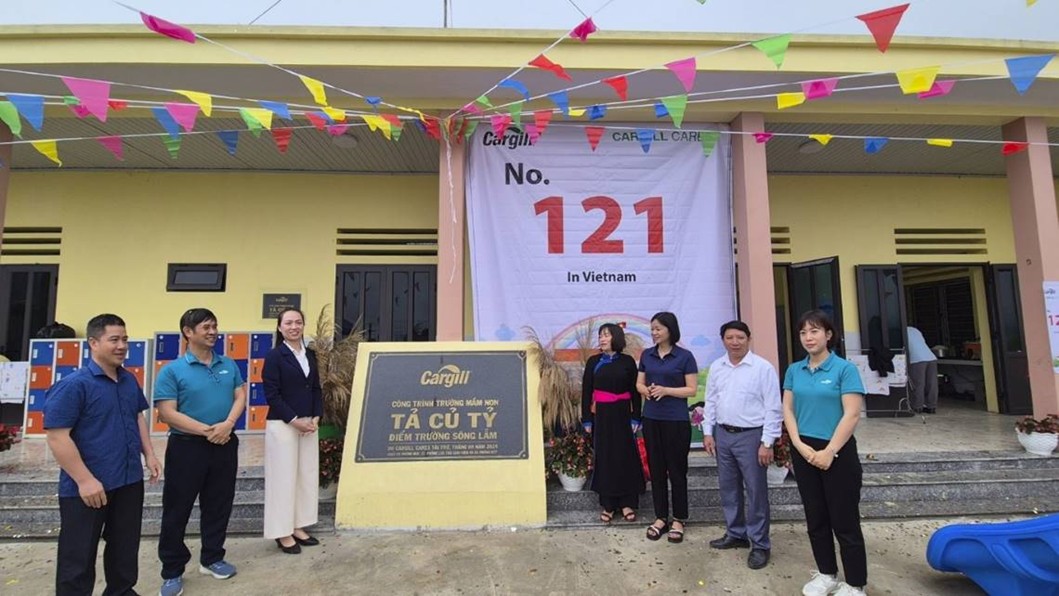Nearly three decades after entering Vietnam, Cargill has become more than merely a global agribusiness. The U.S.-based company has embedded itself in the social fabric of the country, working to uplift disadvantaged communities, expand educational access, and promote environmental sustainability. From supporting ethnic minority households in the Central Highlands to building schools in remote provinces and reducing water pollution in the Mekong Delta, Cargill’s initiatives demonstrate a long-term commitment to responsible business growth.
Supporting livelihoods in Dak Lak
At the heart of Cargill’s community engagement lies its work with women and ethnic minorities in Dak Lak Province. Over the past three years, more than 16,000 people—most of them women from minority groups—have received training, financial support, breeding stock, and agricultural supplies to strengthen production skills, manage household finances, and access new markets.
These efforts are part of the She Thrives project, funded by Cargill Vietnam and implemented by CARE International in Vietnam. The initiative, which ran from 2022 to 2025, aimed to empower marginalized communities to achieve sustainable livelihoods and greater economic independence.
Speaking at the project’s closing ceremony in August 2025, Nguyen Ba Luan, Cargill’s country representative in Vietnam, said: “We are proud that She Thrives has helped promote sustainable livelihoods and enabled women and ethnic minority communities to be more confident in developing their household economies. Throughout our 30 years in Vietnam, projects like this reflect Cargill’s long-standing commitment to building a more prosperous future for the communities where we operate.”
In three years, the project organized dozens of training courses in livestock farming, coffee processing, and handicraft production, directly supporting 5,260 people—60% of whom were women. Many households reported significant income growth, reinvesting in farm expansion, housing upgrades, and children’s education.
Local farmers also shared their stories. “Thanks to the new training, my goats gained 5 to 7 kilograms in just six weeks—triple the weight gain of traditional methods,” said Y Tuen Nie, a member of a goat-raising group in Ea Drong. “This allowed me to sell them earlier and recover my investment faster.”
Such examples illustrate how targeted interventions can trigger lasting changes in productivity and household wellbeing. By improving market connections and diversifying production, She Thrives has also enhanced the resilience of traditional producer groups in Dak Lak.
Investing in education for future generations
Education has long been central to Cargill’s CSR vision in Vietnam. Since establishing the Cargill Cares Fund in 1996, the company has invested more than US$6 million to build 121 schools and 36 libraries across the country, benefiting over 18,000 students annually.

In 2025 alone, Cargill completed and handed over four new schools in northern provinces, providing safe, well-equipped classrooms for nearly 400 children in rural and mountainous areas. These included preschools in Thai Binh, Dien Bien, Yen Bai, and Lao Cai. Facilities ranged from new classrooms and dormitories to teacher housing, kitchens, and sanitation blocks—ensuring that students not only have access to learning but also to a safe and supportive environment.
The company’s original commitment was to deliver 100 schools nationwide by 2020, a target it met ahead of schedule. With that milestone reached, Cargill set a new goal: 150 schools by 2030. As of this year, 121 schools are already completed, with four more under construction in Khanh Hoa, Quang Tri, Quang Binh and Gia Lai.
For Nguyen Ba Luan, these efforts highlight both trust and responsibility.
“Our school-building program is a testament to the long-lasting trust we have built with rural communities in Vietnam. It reaffirms our contribution to education, socio-economic development, and sustainable growth across the country,” he said.
By investing in infrastructure that benefits children for generations, Cargill is laying the foundation for inclusive development that extends far beyond the classroom.
Protecting water resources in the Mekong Delta
In May 2024, Cargill expanded its corporate social responsibility (CSR) focus to environmental sustainability through a new partnership with the Asia Society for Social Improvement and Sustainable Transformation (ASSIST). Together, they launched the Aqua Xanh project in Ca Mau Province to tackle water pollution and promote sustainable aquaculture practices in the Mekong Delta.
The delta is Vietnam’s rice bowl and seafood hub, but it faces existential threats from climate change, including saltwater intrusion, extreme weather, and flooding. These challenges have pushed many farmers to adopt unsustainable practices, further degrading water quality and threatening long-term livelihoods.
Aqua Xanh seeks to reverse this cycle by training shrimp farmers in sustainable aquaculture methods that comply with Aquaculture Stewardship Council (ASC) standards. Over two years (2024–2026), the project aims to train more than 300 farmers in feed management, waste treatment, and biodiversity conservation, while raising environmental awareness among 1,000 community members.
Pilot demonstration farms will showcase recycling and waste-reduction practices, while also monitoring plastic pollution. The project is expected to reduce water pollution, improve aquaculture resilience, and support Vietnam’s efforts to build a climate-adaptive seafood industry.
“By focusing on both technical training and community engagement, Aqua Xanh is not only reducing pollution but also building a foundation for sustainable aquaculture in one of Vietnam’s most vulnerable regions,” said project coordinators.
A long-term commitment to Vietnam
Cargill’s impact in Vietnam goes beyond philanthropy. Its initiatives are integrated into the broader goal of sustainable development—supporting farmers, empowering women, educating children, and protecting natural resources.
The company’s support of the She Thrives project with a US$200,000 grant in 2025, its continuous investment in school-building, and its commitment to cleaner aquaculture all underscore a consistent approach: CSR as a long-term partnership with communities.
From Dak Lak to Ca Mau, Cargill’s programs reveal how multinational corporations can play a constructive role in Vietnam’s development journey. As the company marks nearly 30 years in the country, its legacy is measured not only in business success but also in the stronger, healthier, and more resilient communities it has helped create.









